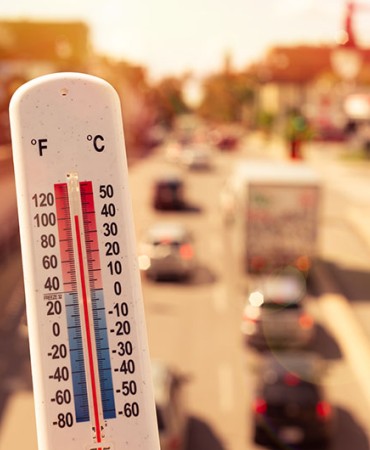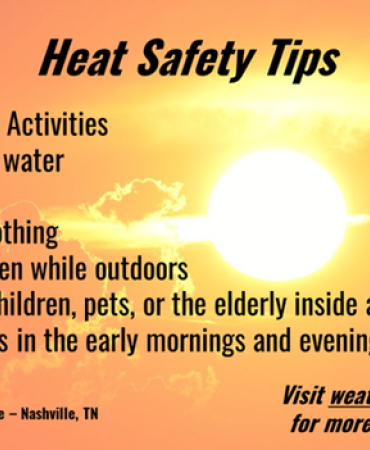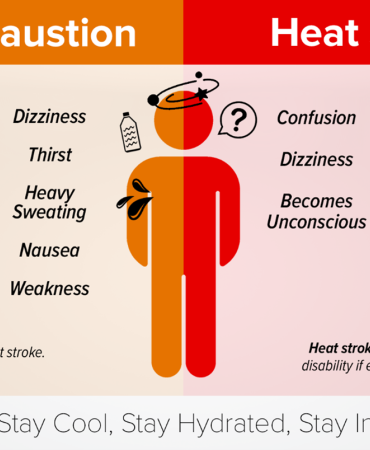Metro Nashville Davidson County is currently under a Heat Advisory, which will remain in effect until Tuesday, July 16, 2024, at 8:00 p.m.
The Nashville Office of Emergency Management (OEM) urges everyone to take necessary precautions to stay safe during this period of extreme heat.
Heat Patrols
OEM Emergency Support Unit (ESU) volunteers will be conducting heat patrols on Monday and Tuesday from 2:00 p.m. until around 5:00 p.m. both days.
These dedicated volunteers will be visiting areas where vulnerable populations tend to gather, offering cold water, towels, and additional resources to help individuals escape the scorching temperatures.
As the heatwave continues, it is crucial for everyone to take precautions to prevent heat-related illnesses.
Keep these heat safety tips in mind:
- Stay hydrated by drinking plenty of water throughout the day.
- Limit outdoor activities during the hottest hours of the day.
- Wear lightweight and loose-fitting clothing.
- Use sunscreen with a high SPF to protect your skin from harmful UV rays.
- Check on elderly neighbors, friends, and family members to ensure their well-being.
- Never leave children or pets inside of cars. Temperatures can soar inside the vehicle quickly leading to heat stroke and even death.
Stay safe and cool during this period of extreme heat.
Other Heat Safety Tips
- Limit outdoor activity
- Drink Lots of water
- Avoid alcohol
- Wear light clothing
- Wear sunscreen while outdoors
- Never leave children, pets or the elderly inside a parked vehicle
- Work Outdoors in the early mornings and evenings
Visit the National Weather Service for more tips and resources.
Things to remember during this expected period of extreme heat:
For Children
- Never leave your child alone in a car, not even for a minute or if the car is running.
- Keep your car locked when you are not in it, so kids don't gain access.
- Create reminders by putting something in the back seat next to your child, such as a briefcase, purse, cell phone or your left shoe.
- If you see a child alone in a car, call 911.
- Set a calendar reminder on your electronic device to make sure you dropped your child off at daycare; develop a plan so you will be alerted if your child is late or a no-show.
For Older Adults
- People aged 65 years or older do not adjust as well as young people to sudden changes in temperature, according to the Centers for Disease Control and Prevention (CDC).
- Older adults should stay in air-conditioned buildings as much as possible. If your home doesn’t have air conditioning, contact your local health department, or locate an air-conditioned shelter in your area like city community centers, libraries, and other public buildings.
- Do not rely on a fan as your main cooling source when it’s extremely hot outside.
- Drink more water than usual and don’t wait until you’re thirsty to drink.
- If your doctor limits the number of fluids, you drink or has you on water pills, ask them how much you should drink during hot weather.
- Don’t use the stove or oven to cook—it will make you and your house hotter.
- Wear loose, lightweight, light-colored clothing.
- Take cool showers or baths to cool down.
- Do not engage in very strenuous activities and get plenty of rest.
- Check on a friend or neighbor and have someone do the same for you.
For Pets
You should also pay close attention to your pets during the hot and humid days ahead.
According to the American Society for the Prevention of Cruelty to Animals (ASPCA) you should know:
- Pets can get dehydrated quickly, so give them plenty of fresh, clean water when it’s hot or humid outdoors.
- Make sure your pets have a shady place to get out of the sun, be careful not to over-exercise them, and keep them indoors when it’s extremely hot.
- Know the symptoms of overheating in pets, which include excessive panting or difficulty breathing, increased heart and respiratory rate, drooling, mild weakness, stupor or even collapse. Symptoms can also include seizures, bloody diarrhea, and vomit along with an elevated body temperature of over 104 degrees.
- Animals with flat faces, like Pugs and Persian cats, are more susceptible to heat stroke since they cannot pant as effectively. These pets, along with the elderly, the overweight, and those with heart or lung diseases, should be kept cool in air-conditioned rooms as much as possible.
- Never leave your animals alone in a parked vehicle.
- When the temperature is very high, don’t let your dog linger on hot asphalt. Being so close to the ground, your pooch’s body can heat up quickly, and sensitive paw pads can burn. Keep walks during these times to a minimum.
Metro Nashville’s Action Commission has programs available to help with energy assistance.
Know the Signs of Heat Illnesses
Heat Exhaustion
- Dizziness
- Thirst
- Heavy Sweating
- Nausea
- Weakness
Act Fast
- Move to cooler area
- Loosen clothing
- Sip cool water
- Seek medical help if symptoms don't improve
Heat exhaustion can lead to heat stroke.
Heat Stroke
- Confusion
- Dizziness
- Becomes Unconscious
Act Fast
- Call 911
- Move person to cooler area
- Loosen clothing and remove extra layers
- Cool with water or ice
Heat stroke can cause death or permanent disability if emergency treatment is not given.



